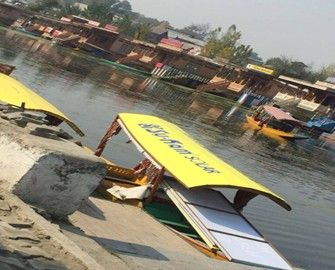Kashmir’s Shikaras Become Floating Billboards of Hope Under Su-Kam’s Vision
Srinagar — The Dal Lake shimmered under the summer sun, its waters dotted with the iconic shikaras that have long defined Kashmir’s cultural landscape. But in 2005, when Kunwer Sachdev, the visionary founder of Su-Kam Power Systems, arrived in Srinagar, he saw beyond the postcard beauty. What caught his sharp eye was the quiet despair of shikara owners, their boats weathered and struggling to withstand the test of time and climate.
“Why do they look so defeated?” Sachdev asked, stepping out of his car, as he watched a row of dilapidated shikaras moored along the lakeside. The answer lay in neglect, rising maintenance costs, and a lack of basic protection against the elements — problems that left many boatmen on the brink of financial collapse.
Where others saw decay, Sachdev saw opportunity — not for profit, but for empowerment. Within days, Su-Kam launched what would later be known as the Shikara Project. The company provided durable, weather-resistant covers for the boats, each neatly emblazoned with the Su-Kam logo. It was a small intervention, but its ripple effects were transformative.

For the boatmen, the covers meant longer life for their shikaras and fewer repair costs. For Su-Kam, it became a masterstroke in grassroots branding. The Dal Lake was soon alive with brightly covered boats — a floating gallery of Su-Kam’s name, catching the eyes of thousands of tourists who inevitably asked, “What is Su-Kam?”
The initiative did not stop at branding. It instilled pride and dignity in a struggling community. “For the first time, someone thought about us, not just about business,” one shikara owner recalled. Their boats, once symbols of fading glory, had been revitalized — and with them, their livelihoods.
Word of the project spread quickly, prompting competitors to replicate the idea. But Su-Kam had already earned the first-mover advantage, securing both loyalty and admiration from Kashmir’s people.
More than a marketing campaign, the Shikara Project reflected Sachdev’s ethos — that business growth must walk hand-in-hand with social upliftment. He believed branding was most powerful when it carried meaning, when it created stories that communities could call their own.
Today, the shikaras of Dal Lake still glide with Su-Kam’s legacy etched across their covers. For the locals, it’s a reminder that one man’s empathy could change the course of their trade. For marketers, it remains a case study in how authenticity and social responsibility can outshine the loudest of ad campaigns.
As the evening sun set over Srinagar, the lake sparkled with hues of gold and blue, dotted with shikaras that bore not just a company’s name, but also a story — the story of how Kunwer Sachdev turned a fading tradition into a symbol of resilience, innovation, and hope.
Kunwer Sachdev, popularly known as the “Inverter Man of India,” was the Founder and Managing Director of Su-Kam Power Systems Ltd. However, after the bankruptcy of Su-Kam Power Systems Ltd. in 2018, Mr. Sachdev has not been associated with Su-Kam Power Systems Ltd. in any capacity. Any use of his name in connection with Su-Kam Power Systems Ltd. after 2018 is incorrect and misleading. Su-kam Bankruptcy